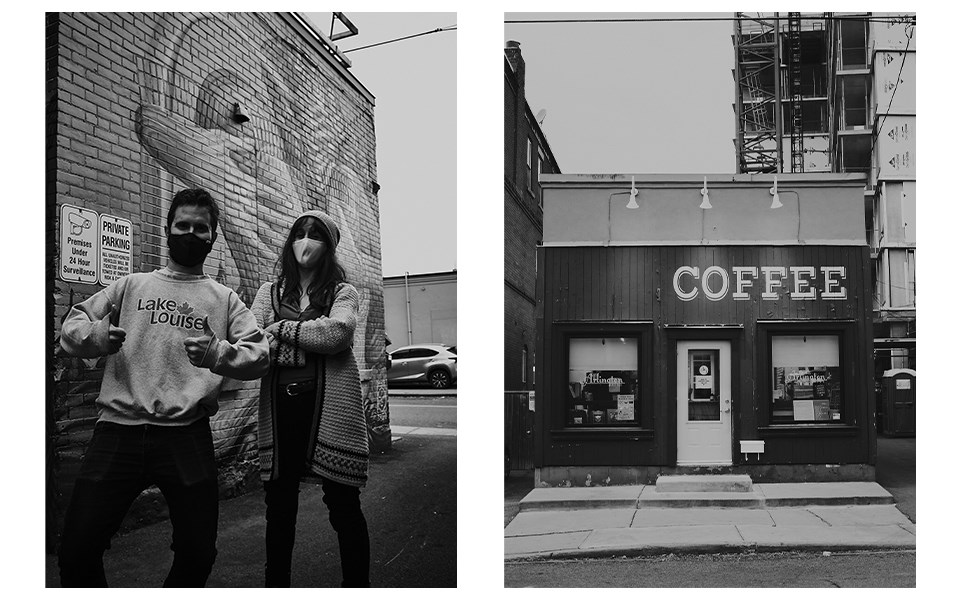‘We’re having a bit of fun’: how Centretown’s Arlington 5 is rethinking the coffee shop’s place
Posted Dec 2, 2020 02:00:00 PM.
A year ago, Ottawa's Arlington 5 was, in many respects, a model coffee shop.
On any given day you could find its espresso machines huffing and whirring, baked goods being served, coffees poured, and a small army’s worth of folks typing away on laptops. The coffee was good. The vibe was good. Things were going well.
If you asked her now, owner Jessie Duffy would say there’s no obvious pathway back to that — partly because of the pandemic, and partly because of the way it changed her idea of what the community needed out of Arlington 5.
“I’ve been saying this since the beginning,” Duffy says. “We’re not going back. We're going forward. It’s not going to look like what it used to look like, because it wasn’t functioning for us.”
The coffee shop game, she says, was a tough business even before the pandemic.
Starbucks and other large, rich chains had cemented in people’s minds the ideas that coffee shops were remote offices, places to spend a day staring into your laptop.
“They built a model that is pretty disembodied,” she says. “It’s a bunch of people who are disconnected from what they are consuming, and disconnected from each other.” (Hard to turn a great profit when someone can come in all day and spend only $10, I observe. “$10 — if that! she replies.”)
To return to that idea of the coffee shop, Duffy suggests, would on one hand be a challenge, and on the other, would be a bit of a letdown to the community, who, she’s realized, could be benefiting so much more from the space. The restaurant industry was always supposed to be about serving the community around it; the pandemic forced her and many others to examine whether or not it was actually doing that.
Accordingly, Arlington 5 finds itself in the midst of a re-think.
Instead of slinging takeout orders to keep the lights on, Duffy has been using the space for more community-focused purposes, including having staff make meals for Cooking for a Cause, a social program run out of the Parkdale Food Centre.
“The meals that we make go out the back door” — through Cooking for a Cause, food is given out where it is needed — “and the meals that we make also go out the front door,” to paying customers. This, Duffy says, shows the kind of ways a restaurant can support its community, not only its customers.
“The whole idea of equalizing and making our menu accessible to all has been really important since the beginning of this,” she says. “I think that will continue [after the pandemic]. Then we could invite people in to really experience what we’re doing. I think we would see, not just an open house, where people come in and sit on their laptops and be in their own space, but an intentional space where we would invite people in to be a part of what we’re up to.”
She has a new coffee roaster — Kevin Joanisse, who roasts as Lulo Coffee — who she invited in on these kinds of fluid terms. They are teaming up, testing the waters, seeing what works for each other and for customers. Ask them to define their business relationship, and they sort of can’t. That’s a fun change of pace for the both of them, and a more sustainable one at that.
 Left: Kevin Joanisse and Jessie Duffy; Right: Arlington 5 exterior. Kieran Delamont.
Left: Kevin Joanisse and Jessie Duffy; Right: Arlington 5 exterior. Kieran Delamont.The irony to all of this is that in rejecting, to some degree, the conventions of a modern coffee business, Duffy is essentially hoping to create something that resembles the vaunted coffeehouse of days past — a space for community connections, a place for the messy human work of dreaming up ideas and forging relationships.
“People sitting at the counter working on their master’s thesis, getting a chance to talk about it across the counter. Maybe someone over here says, ‘Hey, I’m actually working on something similar,'” Duffy imagines. “It’s that ever-evolving exchange of ideas and innovation. We all benefit from that.”
So in Duffy’s mind, there is no one answer to the question, “What’s next?” What’s next will figure itself out. What’s next will be determined by what’s needed, and what’s needed is always changing, as well as hard to predict. What’s needed, in Duffy’s mind, is a place for that fluidity, where the hungry can be fed, and where food means more than act of commerce. What’s needed is a place where food is human again.
“It really is this idea of mutual benefit,” she says, pointing all around here. “This is a mutual benefit. For want of a better word, it’s very organic. We’re just playing. We’re having a bit of fun.”










